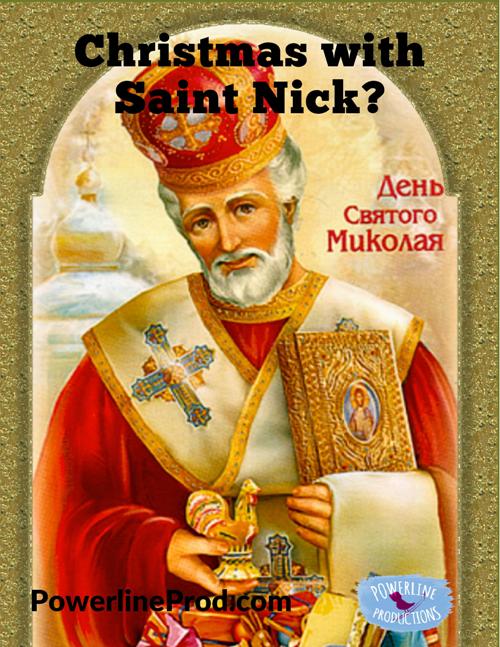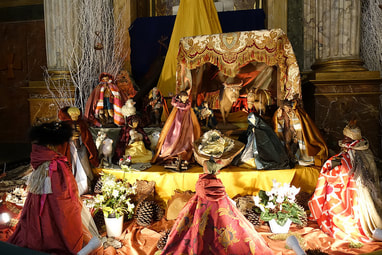 This is an essay my daughter wrote years ago when she was in high school for her God's Girls 106: Hospitality, Friendship, and Celebrations class. I thought it was awesome and share it with you.... Christmas is a holiday all about....well, about the Christ child who gave it its name, right? While the secular world, in the midst of singing carols that explicitly remind them, may forget the origin of this holiday, as Christians, we believe Christmas is all about Jesus’ birth. Believing this, and in the beauty of the “magic of Christmas,” many Christian parents seek ways to make this Christ-holiday (or holy day) a special time for their children. They want their children to hold beautiful, sparkling memories of Christmas as a little kid, to be able to look back and remember how loved they were and how “magical” and special Mom and Dad made Christmas. So, as good moms and dads, Christian parents draw from the well of Christmas memories from their childhood and begin to create those same memories with their children. There is something so special about family traditions passed down from one generation to the next. We remember the spicy pine smell of Christmas trees, the plates of Christmas cookies, the excitement of waiting for Santa Claus, and we want our children to share those joys. So, we bring home a Christmas tree, we bake cookies for hours in the kitchen, and we carefully foster our children’s faith in Santa Claus. However, as we nurture beautiful memories for our children, we come across a question in Christian circles: Is it wrong to teach children about Santa Claus?  Will this miniature deception hurt your child? Or is it just a game of pretend. Or is it a good childhood memory that every little boy and girl should have in his or her shelf of memories? Perhaps the first question we should face in discovering whether belief in Santa is a positive tradition or not is: Why do we teach about Santa? Most likely, it is one more way, or perhaps the biggest way we believe, for little ones to experience the “magic” and excitement of Christmas. We look forward to the thrill of anticipation on their little faces as they come creeping out on Christmas morning to find out “What Santa has brought me!” However, this should lead us back to one simple truth about traditions and, most of all, about Christmas. Christmas is about Christ and His birth. Our lives are about Christ and His birth, death, and resurrection—about His salvation for us! Christmas is my favorite holiday because it reminds me of how beautiful that gift of salvation is that the great and mighty God should become a lowly little baby in a humble dirty stall. The beauty and magic of Christmas is the glory of the Lord becoming man for us. Christmas should be a celebration for Him. And all Christmas traditions should ultimately further that understanding in our little ones. Ultimately, any of the traditions from Christmas trees to baking cookies can be unhelpful if they distract us from making Jesus and His story the center of Christmas. Does the Santa Claus tradition help focus Christmas on Jesus?  One grave problem in fostering a belief in Santa Claus in our children is that it is, quite simply, a lie. That may sound like a harsh word for such an innocent and “magical” belief, but teaching our children about Santa Claus really isn't the truth. And all children, sooner or later, find that out. This discovery is not usually traumatic (except to the mother discovering her baby's growing up!), but it is a discovery, most often a growing awareness, that the story their parents have always told them is not necessarily true. That, in fact, it is a “harmless deception,” that was told to allow them to hold onto some sense of magic and faith as a child. This might not seem very important; after all, we fib about the surprise party we’re throwing our child and husbands assure their wives that they LOVE the new haircut when really they hadn’t noticed it, but this little fib about Santa Claus is a lie that encourages faith in something that cannot be proved true (after all, Santa can’t work his magic and bring toys to little boys and girls who don’t believe in him). This is a little bit like.....Jesus. And the experience of growing up for our little ones, as so many know, is not just finding out that Mom and Dad aren’t always perfectly honest but is finding out that, really, you can't just trust in things that are unseen; you have to trust in evidence. A little seed of doubt is planted in their hearts whether Mom and Dad could possibly have lied about the baby Jesus, too. When these little boys and girls grow up and go off to college, and read authors like Marx explain why religion is the “opiate of the masses,” a fairy tale told us to keep us content and quiet, to keep us happy with the unreal so we don’t ever experience the real, what is to keep them from wondering whether that doesn’t just make sense? They have already learned that part of growing up is realizing you just can't believe in things without proof, that such simple faith is childish (though Jesus clearly preached "faith like a child") Perhaps such a drastic denial of faith in general because their faith in Santa Claus was unfounded may seem improbable. Perhaps it will not happen. But the risk of sacrificing our children’s faith in the truth of Christ for a make-believe story about Santa and his reindeer is not one worth making. Not only does faith in Santa potentially lead to a loss of faith in Christ, the tradition of Santa almost always overruns Christmas. You can be moderate in your practice of the Santa Claus tradition, but Santa does take precious time and effort from Christ. The focus is supposed to be on Jesus' birth, but when you watch the television shows and movies, the commercials and songs, and the only politically correct questions teachers and neighbors and store clerks are now allowed to ask children, Santa, not Jesus, has become the star of this show. Children do things “for Santa”; Christmas is the spirit of joy and giving, epitomized in…Santa; the Christmas decorations and Christmas cards are almost all about…Santa. The secular world has decided it can still celebrate the birth of a Savior it no longer worships or cares about by giving the holiday a new center. And that center is Santa. And with Santa comes a greater focus on commercialism. Though the focus can become on giving “like Santa,” instead of on “what Santa is going to bring you,” the secular promotion of Santa generally focuses on Christmas as a time of receiving gifts and enjoying the “magical spirit of Christmas.” Even when giving rather than getting is kept the focus in our Santa traditions with our children, we want and need to spend all our time and put all our focus on the best gift of all that represents the true meaning of Christmas. Santa too easily overshadows that. Christmas is Christ's holy day. It belongs to Him and celebrates Him. He gave it to us when He gave us Himself. Ultimately, the true magic that everyone raves about and defines as the “spirit of giving,” or even the spirit of Santa, is the taste and reminder that is leftover of what Christmas truly is: the Presence of God come to meet us and love us and fill us and heal us. The spirit of Christmas is Jesus. We want our children to know, not some indefinable “magic,” but the true beauty and glory (and, yes, it is magical, an intangible bit of delight that we cannot explain or understand, but not because it is an illusion or pretend) of Christmas is Christ and we want our children to experience Him and bring honor to Him at Christmas. When Santa Claus doesn't help us do that, when he takes just the focus and energy of Christmas off Jesus, when he robs our children of a firm trust in the Lord, then he is not worth keeping.  There are so many special Christmas traditions and memories we can create that can bring the spotlight back to the stable. Christmas plays with the family actors and actresses, making special crafts, doing Christmas baking together while we talk about what we want to get for our friends and family, listening to Christmas music that declares God’s praises, and decorating the house are all great traditions that set Christmas apart for our little ones. It can be quite all right to have a Christmas tree and Christmas cookies (though if you start wishing everyone a “Happy Cookie Day” or singing song after song about Christmas trees, you might have a problem!). Let’s just make every effort to initiate and further only those traditions that will not potentially distract both our children and ourselves from the true meaning of Christmas. After all, Jesus is the Reason for the Season. Merry Christmas! Katie-Beth Curtis Nolette
0 Comments
Leave a Reply. |
AuthorsMeredith Curtis Archives
February 2020
Categories
All
|
Powerline Productions
- Home
-
Books
-
Curriculum
- HIS Story of the 20th Century >
-
High School Courses
>
- Economics, Finances, & Business >
- American Literature & Research
- British Literature
- Who-Dun-It Murder Mystery
- Foundations of Western Literature
- Communication 101: Essays & Speeches
- Old Testament Survey
- Worldview: Understand the Times Workbook
- Drama
- Career Choices & the College Decision
- Real Men 101
- Real Men 102
- Real Men 103: Leadership
- God's Girls 101
- God's Girls 103
- God's Girls 104: Motherhood
- God's Girls 105: Homemaking
- Travel God's World Geography >
- Government
- Unit Studies >
- Teach History the Fun Way >
- Families Learn Together American History >
- STEM Notebooking Pages
- Middle School Courses >
-
Bible
- Cozy Mysteries
- Blog
Photos from cloudzilla, Fil.Al, vaniljapulla, m01229, Ian D. Keating, (Imagine) 2.0, Theo Crazzolara, RomitaGirl67, RomitaGirl67, Gonmi, moonlightbulb, RomitaGirl67, Amydeanne, Salva Martinez, Graham Ó Síodhacháin, Ruth and Dave, infomatique, MsSaraKelly, moonrat42, {Guerrilla Futures | Jason Tester}, Monica's Dad, kennethkonica, o palsson, Tourismusregion Katschberg, wuestenigel, COD Newsroom, ANBerlin, Henri Photography, Tourismusregion Katschberg, Corey Ann, *_*, diannlroy.com, Theo Crazzolara, DaPuglet, terren in Virginia, George M. Groutas, Bunches and Bits {Karina}, Anders Ruff Custom Designs, ¥§•ªˆ¨ˇ© LOVE © ˇ¨ˆª•§¥, srqpix, inkknife_2000 (8 million views +), judy dean, ANBerlin, Phil Roeder, Base Camp Baker, Anders Ruff Custom Designs
 RSS Feed
RSS Feed







